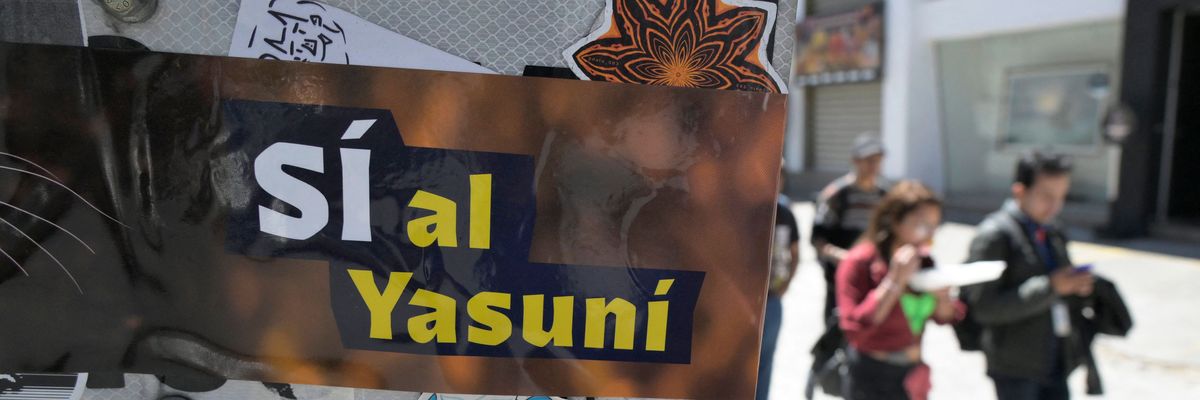Ecuadorian voters on Sunday headed to the polls to cast their votes in both a snap presidential election and to take what environmental justice campaigners said was a "once-in-a-lifetime" opportunity to help protect one of the world's most vital ecosystems.
Signs urging the public to vote "Sí al Yasuni" or "yes" for the Yasuní National Park in the Amazon rainforest have been plastered across the country in recent weeks, as organizers call on voters to support a referendum that would stop oil drilling in the Yasuní Ishpingo-Tambococha-Tiputini oilfield.
The 198,000-hectare park is Ecuador's largest protected area and is home to 1,130 species of trees—more than the United States and Canada combined—165 mammal species, 630 species of birds, and over 100,000 insect species per hectare.
The Indigenous Waorani, Kichwa, and Shuar people coexist in the region, as well as the uncontacted Tagaeri and Taromenan tribes.
As Indigenous rights group Survival International said in a video posted to social media on Saturday, oil drilling in the tribes' territory "poses a huge threat to their survival" as well as perpetuating an energy system that scientists have warned is heating the planet and causing dangerous sea level rise and extreme weather events.
Former Ecuadorian President Rafael Correa began an initiative after taking office in 2007 to keep the oil in the ground in Yasuní National Park, creating a fund equal to half of the oilfield's reserves and asking other countries to pay into the fund in exchange for not drilling.
But the initiative ended in 2013 and state oil firm Petroecuador has extracted as many as 57,000 barrels of oil per day from the park since then.
The grassroots movement Yasunidos has spent a decade gathering 750,000 signatures to support the placing of the referendum on ballots and Ecuador's top electoral court ruled last year that the vote could go forward.
If the referendum is successful, said human rights group Global Justice Now, Ecuador could "become the first country to limit fossil fuel extraction through direct democracy."
"Ecuadorian campaigners are defending their local environment while standing on the frontline of the global battle to keep fossil fuels in the ground," said Izzie McIntosh, climate campaign manager for the group. "Whichever way the vote goes, they have sent a clear message to polluting multinationals: communities will not stand by while corporations profit at the expense of the Amazon, and our planet's collective well-being."
After 10 years of oil extraction in the fragile rainforest, the referendum offers Indigenous tribes and the entire country the possibility of "a different future," Hueiya Cayuiya, founder of the Waorani Women's Association of the Ecuadorian Amazon, told The Guardian.
"If we win, it will be a triumph for Ecuador," said Cahuiya. "We don't want any more contamination in our rivers, any more extraction on our land."

